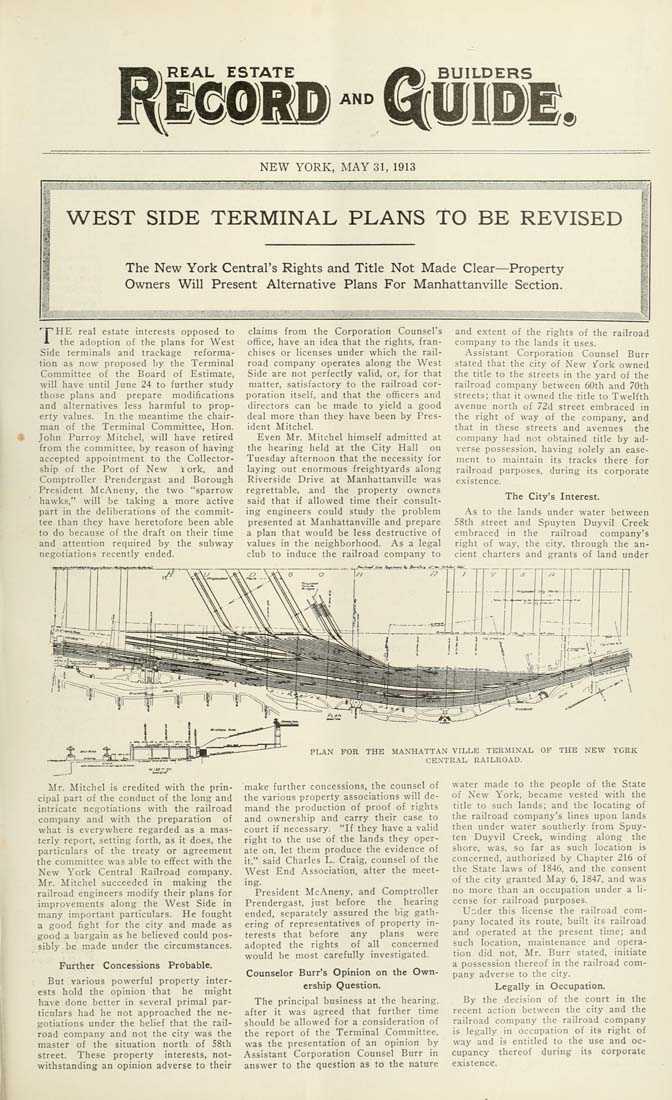Please note: this text may be incomplete. For more information about this OCR, view
About OCR text.
BUILDERS
AND
NEW YORK, MAY 31, 1913
WEST SIDE TERMINAL PLANS TO BE REVISED
The New York Central's Rights and Title Not Made Clear--Property
Owners Will Present Alternative Plans For Manhattanville Section.
-'JiiKwiiiiiiiiiiiiiawiPMiaM^^^^^^^
rHE real estate interests oppused to
the adoption of the plans for West
Side terminals and trackage reforma¬
tion as now proposed by the Terminal
Committee of the Board of Estimate,
will have until June 24 to further study
those plans and prepare modifications
and alternatives less harmful to prop¬
erty values. In the meantime the chair¬
man of the Terminal Committee, Hon.
John Purroy Mitchel, will have retired
from the committee, by reason of having
accepted appointment to the Collector-
ship of the Port of New l ork, and
Comptroller Prendergast and Borough
President McAneny, the two "sparrow
ha-wks," will be taking a more active
part in the deliberations of the commit¬
tee than they have heretofore been able
to do because of the draft on their time
and attention required by the subway
negotiations recently ended.
claims from the Corporation Counsel's
office, have an idea that the rights, fran¬
chises or licenses under which the rail¬
road company operates along the West
Side are not perfectly valid, or, for that
matter, satisfactory to the railroad cor¬
poration itself, and that the officers and
directors can be made to yield a good
deal more than they have been by Pres¬
ident Mitchel.
Even Mr. Mitchel himself admitted at
the hearing held at the City Hall on
Tuesday afternoon that the necessity for
laying out enormous freightyards along
Riverside Drive at Manhattanville was
regrettable, and the property owners
said that if allowed time their consult¬
ing engineers could study the problem
presented at Manhattanville and prepare
a plan that -would be less destructive of
values in the neighborhood. As a legal
club to induce the railroad company to
and extent of the rights of the railroad
company to the lands it uses.
Assistant Corporation Counsel Burr
stated that the city of New i^ork owned
the title to the streets in the yard of the
railroad company between 60th and 70th
streets; that it owned the title to Twelfth
avenue north of 72d street embraced in
the right of way of the company, and
that in these streets and avenues the
company had not obtained title by ad¬
verse possession, having solely an ease¬
ment to maintain its tracks there for
railroad purposes, during its corporate
existence.
The City's Interest.
-•\s to the lands under water between
SSth street and Spuyten Duyvil Creek
embraced in the railroad company's
right of way, the city, through the an¬
cient charters and grants of land under
PLAN FOR THE JIANHATTAN VILLE TERMINAL OP THE NEW YORK
CE.NTRAL RAILROAD.
I
Mr. Mitchel is credited with the prin¬
cipal part of the conduct of the long and
intricate negotiations with the railroad
company and with the preparation of
what is everywhere regarded as a mas¬
terly report, setting forth, as it does, the
particulars of the treaty or agreement
the committee was able to eflfect with the
New York Central Railroad company.
Mr. Mitchel succeeded in making the
railroad engineers modify their plans for
improvements along the West Side in
many important particulars. He fought
a good fight for the city and made as
good a bargain as he believed could pos¬
sibly be made under the circumstances.
Further Concessions Probable.
But various powerful property inter¬
ests hold the opinion that he might
have done better in several primal par¬
ticulars had he not approached the ne¬
gotiations under the belief that the rail¬
road company and not the city was the
master of the situation north of SSth
street. These property interests, not¬
withstanding an opinion adverse to their
make further concessions, the counsel of
the various property associations will de¬
mand the production of proof of rights
and ownership and carry their case to
court if necessary. "If they have a valid
right to the use of the lands they oper¬
ate on, let them produce the evidence of
it," said Charles L. Craig, counsel of the
West End Association, after the meet¬
ing.
President Mc.-^neny, and Comptroller
Prendergast, just before the hearing
ended, separately assured the big gath¬
ering of representatives of property in¬
terests that before any plans were
adopted the rights of all concerned
would be most carefully investigated.
Counselor Burr's Opinion on the Own¬
ership Question.
The principal business at the hearing,
after it was agreed that further time
should be allowed for a consideration of
the report of the Terminal Committee,
was the presentation of an opinion by
Assistant Corporation Counsel Burr in
answer to the question as to the nature
water made to the people of the State
of New York, became vested with the
title to such lands; and the locating of
the railroad company's lines upon lands
then under water southerly from Spuy¬
ten Duyvil Creek, winding along the
shore, was, so far as such location is
concerned, authorized by Chapter 216 of
the State laws of 1846, and the consent
of the city granted May 6, 1S47, and was
no more than an occupation under a li¬
cense for railroad purposes.
Under this license the railroad com¬
pany located its route, built its railroad
and operated at the present time; and
such location, maintenance and opera¬
tion did not, Mr. Burr stated, initiate
a possession thereof in the railroad com¬
pany adverse to the city.
Legally in Oecupation.
By the decision of the court in the
recent action between the city and the
railroad company the railroad company
is legally in occupation of its right of
way and is entitled to the use and oc¬
cupancy thereof during its corporate
existence,








